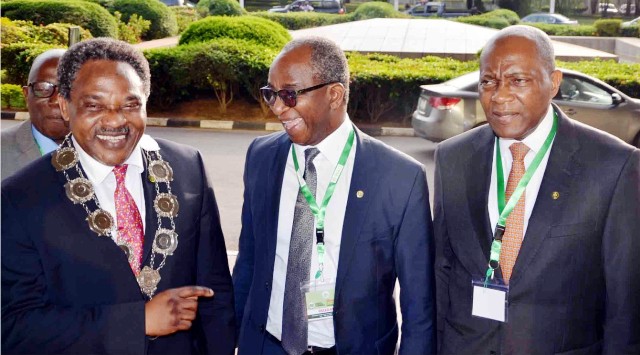Business
NPA Budget: Senate Committee Urged To Fast-Track Passage

The General Manager, Eastern Ports, Mr Abubakar Goje, has solicited the support of the Senate Committee on Marine Transportation to fast track the passage of the NPA budget.
Goje made the plea yesterday in Port Harcourt during the committee’s facility tour of Eastern ports.
He said that the Nigerian Ports Authority (NPA), would achieve its mandate with quick passage of the budget.
The Tide source reports that the Eastern Zone comprises: Rivers Port, Onne Port Complex, Delta Port and Calabar Port.
Reports say that the primary purpose of NPA creating the structure is to decentralise the authority to enable individual ports to response to some operational administration challenges at short notice.
He said that if the budget is passed, it would assist the authority to tackle some challenges facing the Eastern zone.
Goje said that the challenges were as follows; high level siltation along its channel of 45 nautical miles, thereby restricting deep drafted vessels from coming in.
He said that other challenges were; security of the channel; inadequate marine crafts to perform operational obligations; inadequate manpower; shallow channel, inadequate manpower in some technical department and need for continuous training.
Goje said that there were enormous business prospects and opportunities in the Eastern ports because the ports could serve as natural hub for importation and exportation of goods.
He said that there were existing natural harbours; unlimited capacity for Greenfield, downstream industry logistic base and enormous capacity for expansion of Eastern Zone of NPA.
Goje said that the zone was facing enormous challenges such as: community encroachment on railway lines which had stalled the rehabilitation of railway tracks; and lack of operational vehicles and crafts to effectively monitor jetty operations.
The general manager said that the collapsed berth was yet to be reconstructed, adding that the zone was also experiencing some jurisdictional overlaps between National Inland Waterways Authority (NIWA) and NPA in terms of who takes full control of such jetties.
He said that there was need to provide more harbour crafts to improve marine services as well as adequate security in the waterways and the common user areas leading to all the ports.
Goje said that the zone would also explore new cargo lines to increase the volume of its cargo
In his response, the Chairman of the Committee, Sen. Ahmed Yerima, said the committee would look into all the presentations and draw up its recommendations.
Business
Fidelity Bank To Empower Women With Sustainable Entrepreneurship Skills, HAP2.0
Business
President Tinubu Approves Extension Ban On Raw Shea Nut Export
Business
Crisis Response: EU-project Delivers New Vet. Clinic To Katsina Govt.
-

 News2 days ago
News2 days agoAmend Constitution To Accommodate State Police, Tinubu Tells Senators
-

 Politics2 days ago
Politics2 days agoSenate Urges Tinubu To Sack CAC Boss
-

 News2 days ago
News2 days agoDisu Takes Over As New IGP …Declares Total War On Corruption, Impunity
-
Business2 days ago
President Tinubu Extends Raw Shea Nuts Export Ban To 2027
-
Business2 days ago
Crisis Response: EU-project Delivers New Vet. Clinic To Katsina Govt.
-
Business2 days ago
President Tinubu Approves Extension Ban On Raw Shea Nut Export
-
Rivers2 days ago
Etche Clan Urges Govt On Chieftaincy Recognition
-
Sports2 days ago
NDG: Rivers Coach Appeal To NDDC In Talent Discovery

